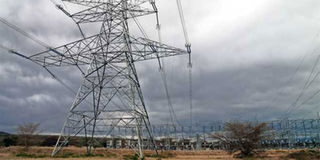Electricity tariffs to drop by 8pc in July, ERC tells House

Electricity transmission lines at the Suswa power substation in Narok. FILE PHOTO | NMG
What you need to know:
- A multi-agency team is reviewing tariffs with the aim of easing charges for consumers.
The Energy Regulatory Commission (ERC) and Kenya Power have announced an eight per cent drop in electricity costs starting next month.
ERC chief executive Pavel Oimeke and Kenya Power managing director Ken Tarus told Parliament that a multi-agency team was reviewing tariffs with the aim of easing charges for consumers.
“The tariff review process is scheduled for completion by end of July and the proposed commencement date is July 1. Billing (new) is to be done in August based on the July consumption,” Mr Oimeke told the Senate Committee on Energy at Parliament buildings in Nairobi yesterday.
Mr Oimeke said Kenya Power and ERC were working on the changes to ensure that future tariffs are predictable and that consumers are not charged for any fixed costs when they do not consume power.
He said that Kenya Power had submitted a tariff review in January that is set to address enhanced customer connectivity, loss reduction, infrastructure development and network maintainance.
“The commission has made a preliminary review of the application and plans for various stakeholder engagement in the month of June and July before making the final determination,” he said.
To address the high cost of electricity, which has led to an outcry, Mr Oimeke told senators that ERC had removed the demand charge for commercial and industrial customers and harmonised them in the energy charge.
He said that monthly fixed charges had been harmonised into one energy charge.
The ERC has also developed a new category comprising consumers of up to 15 units who account for 3.5 million customers.
“The area that has been harmonised includes splitting the small commercial category consumers into two based on consumption," Mr Oimeke said.
The two units are the small commercial category comprising consumers of between 1 and 1,000 KWh and the small and medium enterprises (SMEs) group with consumption of 1,001 to 15,000 kWh.
“The changes will ensure that the tariffs are predictable and that consumers are not charged for fixed costs when they are not consuming power,” he told the committee.
Dr Tarus said that consumers on prepaid meters will get the same units for all purchases across the month.
“A harmonised tariff will ensure uniform charges on all units as directed by Energy Cabinet Secretary Charles Keter. This is expected to be in place by July,” Dr Tarus said.
The two had been summoned to provide a progress report on the development of a harmonised electricity tariff and progress on the upgrade of the pre-paid token system by Kenya Power.




